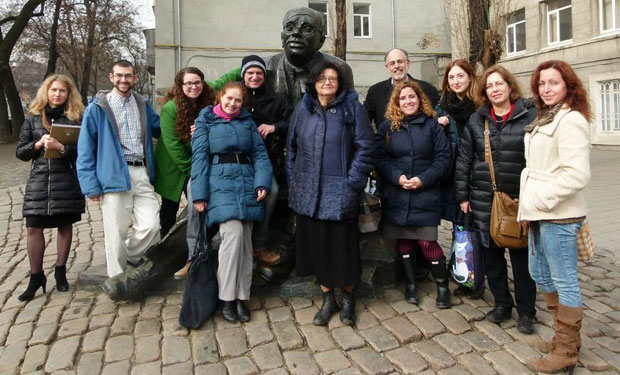Students experience Jewish life in Moldova and Ukraine

Standing with a statue of the famous Jewish writer Isaac Babel in Odessa are (front row from left to right) Yuliya Serebryana, Anna Misiuk, a prominent Odessa Jewish history and culture specialist, Elisheva Massel, Rise Singer, and Darina Privalko, trip coordinator/translator. In the back (left to right), Dina Shvetsov, Noah Zaves, Hannah Sherman, Levi Kerzhner, Mark Rosen, and Hannah Miller, JDC Entwine Fellow working in Odessa at the time.
Eight members of the Brandeis community, including six graduate students enrolled in the Hornstein Jewish Professional Leadership Program, traveled to Chisinau, Moldova and Odessa, Ukraine in February to learn about the current state and challenges of Jewish communities in the former Soviet Union and to deepen their understanding of Moldovan and Ukrainian Jewish history. During this visit, political unrest in Ukraine was building, eventually leading to the ouster of President Viktor Yanukovych.
The trip was organized in partnership with the Brandeis-Genesis Institute for Russian Jewry. Mark Rosen, associate professor in the Hornstein program and Rise Singer, Hornstein program manager, accompanied the students.
One of the students on the trip was Yuliya Serebryana, MA/MBA’14, a native of Dnepropetrovsk Ukraine. She shared some of her reflections on the trip with BrandeisNow.
What did it mean to you to return to Ukraine with the group?
This trip was very special to me. I usually go home to Dnepropetrovsk about every six months, but I had not been back to Odessa in about 10 to 12 years. [Dnepropetrovsk is about 250 miles from Odessa.]
This trip was especially interesting to me because I was able to see Ukraine from the perspective of North American Jewish professionals. In addition, what I’ve learned from the Hornstein program gave me a tremendously new perspective.
Before I came to the United States, I was working in a Jewish community center in Ukraine, so it was a fascinating opportunity to see the operation from a different perspective. I felt a special responsibility to share with the Hornstein group how, in general, the Jewish community functions in Ukraine, and the mentality and the thought process of Jewish professionals there.
How is the mentality of Jews in the former Soviet Union different from that of North American Jews?
Because of the Soviet Union’s influence and the history of Jews’ persecution in Europe, the Jewish identity has stayed on a subconscious level. People were not able to express or practice their Jewish faith openly in the Soviet Union. My grandparents are secular people. They knew they were Jewish, but they didn’t practice their religion. Rather than learning Hebrew or praying, they kept their Judaism on the level of having Jewish meals or passing along the jewelry of a great-grandmother from generation to generation.
When Russian-speaking Jews come to North America, it can be quite challenging to find the right approach to getting them involved in the community. If North American Jewish professionals try to provide them with a traditional religious education, immigrants typically are not receptive. They remember from the Soviet Union times that being Jewish religiously or publicly could be dangerous.
The situation in Ukraine is changing now with the new generation, though. I was born three months after Ukraine declared independence from the Soviet Union. I am the one who brought Judaism home and taught my parents. As a child, I never remember my father going to synagogue or doing anything Jewish-related. Last week, I was speaking with him on the phone, and he was getting ready for Purim.
Some of the other differences between Russian-speaking Jews and American Jews reflect general cultural differences between Americans and Russians.
My sense is that people who live in America — including Russian-speaking Jews who have lived here for 20 years or more — generally focus on careers and professional goals as much as on communal values. Since the time of the Soviet Union, at least for my parents’ generation, community and family comes first and only then career. For example, people there start their families usually in their early or mid-20s, versus people in the U.S., who prefer to get their education first, get settled, get a job and then start their families in their late 20s or early 30s.
Did the political unrest in Ukraine affect your travels?
The unrest did not directly affect our plans in Ukraine. Kiev, where much of the violent protest occurred, is about 300 miles away from Odessa.
We had planned to go to the opera in Odessa – this was an optional event– but the performance was canceled because the government had declared a national day of mourning for the victims of the fighting in Kiev.
We did see some protesters. During our first day [Feb. 20], we went on a bus tour of the town. As we were driving through the central square near the government building, on one side of the street there were government guards, and on the other side there were people wearing masks and protesting.
We did have to change our flight back to the U.S., though. It was supposed to go through Kiev and we would have had a four-hour layover. Our organizers changed the flight to go through Moscow instead.
How is your family doing?
My family is doing well. But it is a very confusing time to be in Ukraine, and no prediction can be made about the future.
Categories: Humanities and Social Sciences, Student Life





